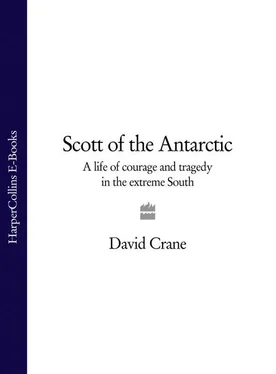He was not united with his luggage again until Calais, and so had to miss Paris, but with the exception of his father all the Scotts that could be rounded up were waiting for him in London. For a family whose idea of excitement was the Plymouth Theatre pantomime the capital must have seemed about as remote as Esquimault, and for the next three days the Scotts gorged themselves on it, cramming in the Handel Festival and Ivanhoe at the English Opera – music a ‘trifle insipid’ – between exhaustive sweeps of the naval exhibition and – that symbol of everything the service still thought it was – Nelson’s Victory moored on the Thames.
Scott had been appointed to Sharpshooter for summer manoeuvres before he joined Vernon , but as she was conveniently anchored at Plymouth there was time first for Outlands. ‘When Con, at the age of nineteen, was wildly in the throes of his first love,’ Grace again recalled, in an elusive glimpse of a side of Scott’s life that has vanished without trace, ‘and longing to rush off to his charmer, who had a very short-tempered husband, Archie alone could speak to him and try to dissuade him from his project; Con at the time was very impressionable, and remained so. The sailor’s life and his romantic nature caused him to idealise women. He had his youthful loves and flirtations. His affections were easily caught though not easily held. He had a capacity for appearing wholly absorbed in the person he was talking to, while all the time he was really quite detached. This was misleading. As far as I know, he had two real loves only; one, a girlhood friend of ours who later married, but was always in the background of his affections, no matter who from time to time interested him for a while, and she remained so, I think, until he met his wife.’
This is a sister talking – and a younger sister, at that, who saw him only rarely – but if there was any other woman of whom Grace never knew, no name survives. Many years later Cherry-Garrard would write of Scott’s astonishing power to charm when he wanted to, and at least one married American woman, a Minnie Chase, a friend’s sister Scott met briefly in San Francisco on his way north to rejoin the Amphion , would happily have signed up to the proposition. ‘The night has a thousand eyes,’ she copied into the front of an address book she probably gave him,
And the day but one,
Yet the light of the bright world dies,
With the dying sun.
The mind has a thousand eyes,
And the heart but one;
Yet the light of a whole life dies,
When love is done.
Conventional enough stuff – the verses are by Charles Bourdillon and were well known at the time – and Scott was in San Francisco only a few days, but those days fixed themselves in Minnie Chase’s memory. ‘Do you remember Mrs Chase 24 years ago,’ Scott’s widow would write to her husband from California in 1913, ignorant that he had already been dead ten months. ‘She fell on my neck because of what a darling you were 24 years ago. She couldn’t believe that you’d remained unmarried so long – the more I think of it the more I wonder with her.’
At twenty-three Scott was slightly below average height, trim and broad-chested, with fair hair, blue, almost violet eyes, an odd, attractively ugly face not unlike Jacky Fisher’s, and a smile that went a long way to explaining the impact of his charm. ‘Well-built, and alert,’ one man who saw him lecturing a few years later described him. ‘Neither tall nor short, he yet conveyed the impression of vigorous quickness. Nine people out of ten, seeing him, would have said, “Naval Officer.”’ It was certainly a role he was well on his way to making his own. ‘Lieutenant Scott is a young officer of good promise,’ his last captain had written in forwarding on his application to Vernon , ‘and has patience and tact in the handling of men. He is quick and intelligent and from all I’ve seen of him I think likely to develop into a useful torpedo officer. I recommend him for the class which commences in October next.’
After his holiday at Outlands and nearly six weeks of manoeuvres in Sharpshooter , Scott took up his place in HMS Vernon , the navy’s Torpedo School Ship at Portsmouth. He would only have had to see a Lieutenant Philip Colomb – another great name in the Victorian navy – on the same list as himself to know what he was still up against, but if there was anywhere that might have symbolised a different navy, it was Vernon , an elegant and streamlined relic of the age of sail that had been laid up, dismasted and brutalised into shape to serve the service’s newest technical arm.
The Vernon had begun its new life as a tender to HMS Excellent , the naval gunnery school, but as the importance of the new weapon became obvious, Vernon broke away from Excellent to become an independent command in her own right. She was lucky enough to have Jacky Fisher for her first captain, and when he was followed in turn by another formidable naval legend and future First Sea Lord, ‘old ’ard ’art’ Wilson, who had hacked and brawled his way to a VC at the Battle of El Teb in 1884, the future of the school was assured.
By Wilson’s and Scott’s time, Vernon had grown in size and importance, with a motley collection of hulks, workshops and a flat iron gunboat with a horizontal funnel jutting out of her stern added to the original establishment. In some ways the unsanitary, rat-infested warren of vessels must have conjured up memories of Britannia and Hindostan for Scott, but the filth and bustle of nineteenth-century Portsmouth was about as far a cry from the quiet beauty of the Dart as Vernon was from anything in the navy Scott had known before.
It was an exciting time to be there, with the torpedo undergoing constant improvements since the first above-water-launched model had been slid into the sea off a mess table. The year before Scott arrived had seen the introduction and testing of a new eighteen-inch weapon with a greater range, speed and accuracy than anything tried before, and for the first time in his life he had the chance to develop – or discover in himself – the technical and scientific aptitude that would so strongly mark his future work.
Even in Vernon , however, the most modern and innovative of establishments, Scott found himself in a culture that paradoxically reinforced those centralising, controlling, anti-initiative tendencies that were the hallmarks of the nineteenth-century service. In his brilliant study of Britain’s pre-First World War navy, Andrew Gordon identified four key institutions – Vernon , the Royal Geographical Society, Royalty and Freemasonry – as comprising a kind of ‘checklist’ of naval ‘authoritarianism’, and what he says of Vernon holds a special resonance for anyone interested in Scott’s later record as an explorer in the unpredictable world of Antarctica. ‘The work of the Torpedo School took place on the frontiers of practical physics,’ he wrote, ‘the staff formed (at least in their own opinion) a naval science vanguard, and their leadership of their profession away from art and into science may have inclined them towards a highly regulated “Newton’s clock” view of the universe, in which the unpredictabilities concomitant with devolved authority had no place.’
If there was one other aspect of Vernon life that was regressive in its tendencies, it was a Raglanesque assumption that any future enemy must be French. During the summer of 1890 exercises around Portland and Plymouth had showed how dangerous boats issuing from creeks on the French coast could be, and over his two summers in Vernon , Scott was involved in similar manoeuvres to counter the threat.
Читать дальше












![John Bruce - The Lettsomian Lectures on Diseases and Disorders of the Heart and Arteries in Middle and Advanced Life [1900-1901]](/books/749387/john-bruce-the-lettsomian-lectures-on-diseases-and-disorders-of-the-heart-and-arteries-in-middle-and-advanced-life-1900-1901-thumb.webp)